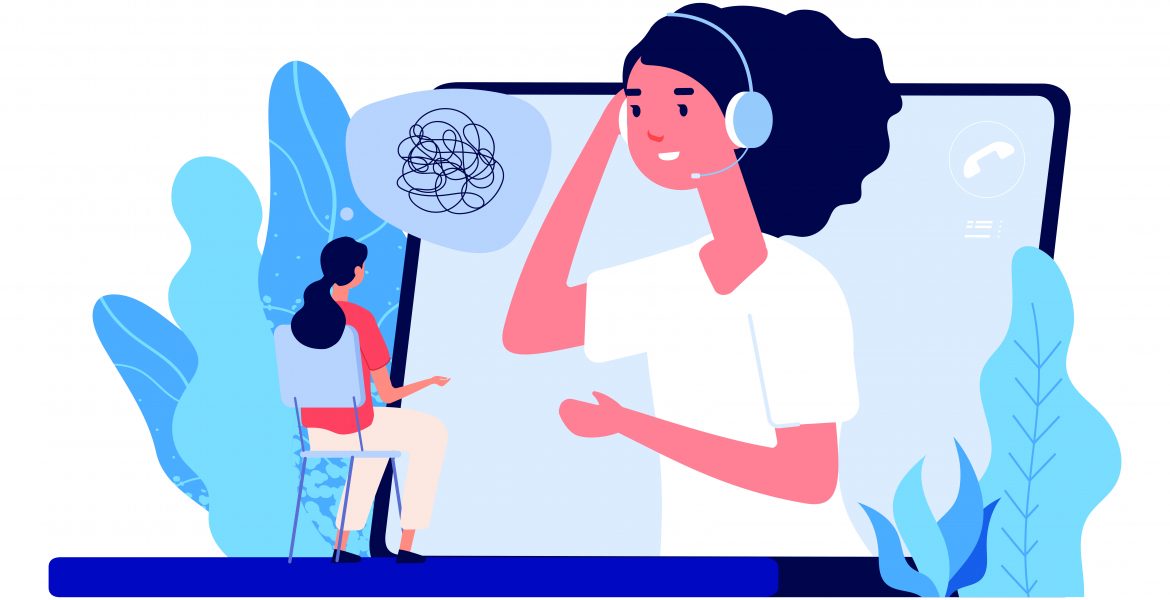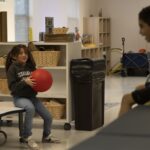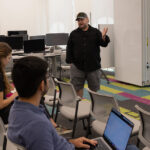Before the coronavirus pandemic, psychology junior Andrea Myers worked full time as a claim benefits analyst at Aetna and attended classes every evening at Texas A&M University-San Antonio.
Now she finds herself behind the screen of a computer over 10 hours a day, working and schooling online.
Myers, who has an associate degree in nursing from Palo Alto College, says she has adjusted to working from home, but it has been difficult. She misses the campus gym and library. She misses interacting with professors and peers.
Myers enrolled at A&M-San Antonio this semester after taking two years off, said she was so excited to be back in school and have social interaction– now she only interacts with “the worst officemate ever to exist,” her mother.
She has started having irregular sleep because of stress and the amount of screen time she is spending in her home office.
“Like some nights I can go to bed as early as 8 p.m., but then last night I couldn’t even think about falling asleep until 1 a.m.,” Myers said.
Where to go from here
With a new lifestyle beginning for students nationally, many feel overwhelmed and stressed. Without regulated work or school schedules due to social distancing, it is easy to pick up some poor coping mechanisms.
Student Counseling and Wellness Services has provided resources for students who may feel stressed because of the coronavirus. Along with phone sessions being offered, the “COVID-19 Self Care Packet” is a .pdf downloadable kit that has tips for students dealing with stress and self-care. The packet has tips on defeating stress, possible positive coping skills, apps to download, sleeping habits to practice as well as dealing with the reality that is the coronavirus.
RISE, a college affordability advocacy group, conducted a survey on over 129 U.S. colleges and found that 52% of students have been unexpectedly laid off from their jobs or had hours cut back since the pandemic. The study found overall that 75% of students had increased levels of anxiety, depression, or stress since the rise of the coronavirus.
Like Myers, some students struggle with insomnia or oversleeping, common side effects of depression, anxiety and stress. Student Counseling and Wellness Services has some tips to combat this. They recommended students download CBT- i Coach, an app that helps users record their sleep schedule and different tools to wind down for sleep and promote a “Quiet Mind.”
Myers says she has started her own journey to improve sleep by listening to a self-guided meditation podcast called Sleep Cove.
“He has a very soft soothing voice and does bedtime stories, affirmations,” Myers said of the 30-minute stories. “He talks about what to do when you can’t control the outside world. I at least stay up for one and when I try to drift off to sleep with it, I make sure I’m listening, meditating and soothing myself down with it.”
There are a variety of positive coping skills students can use to address stress and anxiety. Many include physical activities, like meditation, exercising and dancing to new music, according to the packet. Picking up new habits like these can redirect the mind and entertain some free time.
“I make sure that I’m outside, still breathing, still doing things regularly,” Myers said. “I’ve tried my best to not change my schedule too much, and when I do change it I try to make it productive, like cooking at home or since I’m here and not on the go.”
When the negative takes over
Carly Thompson is a criminology and criminal justice junior in her second semester. Thompson had a very active life before the virus. Now, all of her classes are online and her food service job has cut her hours from full time to part-time.
She says that while she has been home a little more, her social life hasn’t changed much because she still interacts with her coworkers and customers.
She said she is dealing with financial stress and now that she has more free time, she noticed she is drinking more in social gatherings at friends’ homes rather than in bars.
“I’m drinking more now because I have nothing but time,” Thompson said.
Thompson is not alone in using this outlet. U.S. sales of alcoholic beverages rose 55% in the week ending March 21, according to market research firm Nielsen. While alcohol is a common coping mechanism for stress, it is not a positive one. World Health Organization officials are calling drinking during the crisis an “unhelpful coping strategy” for stress and anxiety. They encourage creating new activities to do alone to deal with isolation.
While the packet does touch on the importance of maintaining social outlets, the Centers for Disease Control strongly advise firstly that the best way to prevent illness is to avoid being exposed to this virus.
“The virus is thought to spread mainly from person-to-person,” the CDC reports. “Between people who are in close contact with one another (within about 6 feet) through respiratory droplets produced when an infected person coughs or sneezes.”
The Mays Center is offering virtual Money Coaching sessions; students can schedule appointments via Handshake. In a session, students should expect to discuss financial topics they are interested in learning about. Some examples include “building and sticking with a budget, paying for college, navigating credit, finding your credit report, setting SMART goals to pay off credit cards, buy a car, etc.”
With all the tools available for students, it is still possible to get overwhelmed with this adjustment. Taking a break from reality is very important when being saturated with information.
“Take a break from social media, spend time focusing on you or your friends,” Myers said.
“Everyone right now is on their screens because we are bored and panicked. If it’s something as simple as walking your dog or raking your yard, do it, take that break.”
To schedule a phone session with Student Counseling and Wellness Services, call (210) 784-1331 or visit Student Counseling & Wellness Services: Student Engagement and Success for more information.







